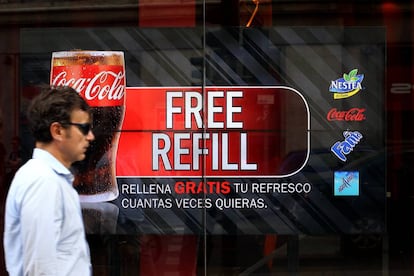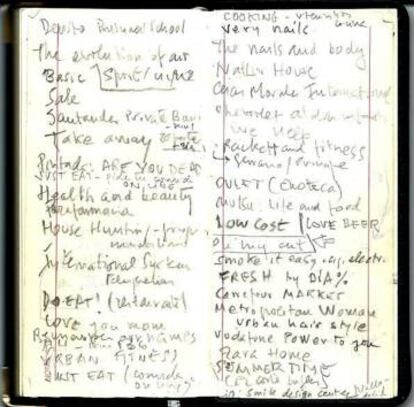What is it Spanish advertisers love about English?
The Royal Academy hopes to persuade the industry that the language of Cervantes is just as effective as Shakespeare’s

A glance over television and print advertising in Spain reveals Buenos Aires non-stop (Argentine Airlines); Feel the extraordinary (NH Hotels); Pop it up. Create the unexpected (Jesuso Ortiz x Swatch), The power of dreams (Honda); Age management medicine (Neolife); New thinking. New possibilities (Hyundai); and This is your time (Tissot).
Using English expressions to sell products is a growing trend in Spain, a phenomenon brought up two years ago at a meeting between the Royal Spanish Academy and Spain’s advertisers. No sooner had the participants sat down than writer and academic José María Merino opened a small black notebook and began reading out some notes he’d take while walking around his neighborhood. “All the stores call themselves ‘markets’,” he pointed out, adding: “Except for the Chinese shops, which call themselves bazars.”
English is associated with what is desirable and upmarket. Those who advertise in English are projecting a cosmopolitan image or a guarantee of advanced technology or quality
Pilar Varela, psychologist
The linguists and advertising executives decided to organize a seminar in May to study the matter further, during which sociologist Enrique Yarza, secretary-general of the Academy for Advertising, an ad hoc body that represents the industry, presented research showing that while just 30 brands were using English to advertise themselves in 2003, by 2015, this had multiplied tenfold, to 322 companies or 20% of the domestic market.
Cristina Santamarina, a lecturer at Madrid’s Complutense University, presented related research suggesting that Spain’s older generation and less-well educated were unmoved by slogans in English. It also suggested that the younger generation did not value Spanish as an international language in the way it did English.
Yarza believes that the trend is due to globalization and international branding, with many advertisements originating in London and New York. He also thinks that as Spanish brands go global, their international identity is highlighted by use of English. English, he says, is seen as modern and aspirational and is often used to make a company appear more innovative.
This belief is reiterated by psychologist Pilar Varela, who says that “English is associated with what is desirable and upmarket. Those who advertise in English are projecting a cosmopolitan image or a guarantee of advanced technology or quality.” But Yarza also believes it is important to avoid the equation of English usage with prestige. “It is true that in the world of luxury goods almost everything is advertised in English. Even Carolina Herrera, who is Venezuelan. That said, there are top of the range cars such as Audi or BMW which are advertised in Spanish and cheaper cars such as Hyundai that use English.”
Psychologist Pilar Yarza believes that the trend is due to globalization and international branding, with many advertisements originating in London and New York
The big question is, of course, what effect this style of advertising has on Spanish consumers. Santamarina believes it goes over the heads of people who don’t speak the language, while Varela maintains that understanding the actual words is of little importance. “The subconscious doesn’t understand English, it only understands emotions,” she says. “The products are portrayed as desirable, mysterious, superior, difficult to attain, but attainable; and these messages can be conveyed simply by using English because we are a bit provincial.”
Yarza agrees that there’s nothing logical about it, citing the example of French carmaker Renault, but which is practically considered a domestic product because so many of its vehicles are made in Spain: “What sense is there in saying ‘Renault, passion for life’ when you can say Pasión por la vida?”. Meanwhile, Peugeot, another French brand, uses the slogan, ‘Motion and emotion.’ Both Renault and Peugeot use the same English slogans in their advertisements in France. However Mercedes-Benz uses: The best or nothing in Spain and its German equivalent, Das Beste oder nichts in Germany.

“The Spanish language is considered prestigious in the field of literature,” says Varela. “This has been demonstrated by our Nobel prizes but that’s no longer relevant, especially for young people. Nowadays science and technology carry more prestige than literature. Spanish is the language of the day-to-day, which is why adverts for detergent are in Spanish.”
But English slogans are not confined to international brands. José María Merino recalls an enormous banner covering the entire façade of a roadside building in a remote town in the middle of La Mancha which declared: ‘Show girls. Low cost.’ English, it seems, is also being used on more unlikely consumers.
Pedro Álvarez de Miranda, an academic, says he’s not surprised at the growing use of English to sell things: “We send our children or grandchildren to bilingual schools and then they go abroad for a year on an Erasmus program, perhaps to the Netherlands to study English. Like it or not, English is important in our society, and I wouldn’t want to do anything about it. Censorship where language is concerned doesn't work. Language is a free zone.”
One thing they all agree on is that there’s nothing to beat a well-turned phrase in Spanish. “Well-written Spanish slogans are very effective,” says Merino, while Álvarez de Miranda adds: “A message in Spanish can go straight to the heart.”
Both Renault and Peugeot use the same English slogans in their advertisements in France
The Academy for Advertising has posted two bogus adverts on social networks and on the internet created by the Grey España agency. The first promotes Sunset Style sunglasses with blind effect. The second advertises a perfume called Swine with the slogan: New fragrance, new woman, showing an attractive model enveloped in pink tones.
Should any unsuspecting consumer feel inclined to buy either product they will discover that blind effect means they’ll be walking into walls and that Swine is another word for pig, whose fragrance is something of an acquired taste.
English version by Heather Galloway.
Sign up for our newsletter
EL PAÍS English Edition has launched a weekly newsletter. Sign up today to receive a selection of our best stories in your inbox every Saturday morning. For full details about how to subscribe, click here.
Tu suscripción se está usando en otro dispositivo
¿Quieres añadir otro usuario a tu suscripción?
Si continúas leyendo en este dispositivo, no se podrá leer en el otro.
FlechaTu suscripción se está usando en otro dispositivo y solo puedes acceder a EL PAÍS desde un dispositivo a la vez.
Si quieres compartir tu cuenta, cambia tu suscripción a la modalidad Premium, así podrás añadir otro usuario. Cada uno accederá con su propia cuenta de email, lo que os permitirá personalizar vuestra experiencia en EL PAÍS.
¿Tienes una suscripción de empresa? Accede aquí para contratar más cuentas.
En el caso de no saber quién está usando tu cuenta, te recomendamos cambiar tu contraseña aquí.
Si decides continuar compartiendo tu cuenta, este mensaje se mostrará en tu dispositivo y en el de la otra persona que está usando tu cuenta de forma indefinida, afectando a tu experiencia de lectura. Puedes consultar aquí los términos y condiciones de la suscripción digital.









































